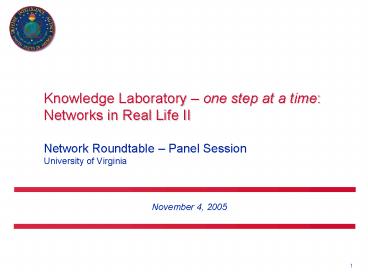Design Template - PowerPoint PPT Presentation
1 / 21
Title: Design Template
1
Knowledge Laboratory one step at a time
Networks in Real Life II Network Roundtable
Panel Session University of Virginia
November 4, 2005
2
What is the Knowledge Laboratory?
- Created out of a strategic planning process
- There was a stated need to change behavior
- More collaborative, integrate functions
- Operates using the three Vs
- Virtual (no physical space)
- Volunteers (no program)
- Virus approach (to transmit new values where work
takes place)
3
Leadership Engagement
- Critical components for success of the Knowledge
Lab - Leadership advocacy at the most senior levels
- Not aligned with any line organization
- Organization-wide scope
- Advocacy at the working-level through pilot
projects - Simultaneously a top-down and bottom-up approach
- The iron-middle is the biggest challenge
4
Overall Context Pilot Projects
Leadership SNA
- Onboarding
- Individuals
- Smart Mentoring
- Pairings
- High Performance
- Teams
Critical Discourse
Peer SNA
Fast Learning
User/Technology Dialogue
Practice new behaviors
Understand the existing culture
5
Peer SNA Knowledge Lab Network
- Nascent network created (150)
- Created in Jan 05
- Survey taken in April 05
- 139 agreed to take survey
- 111 completed the survey
- Network purpose whats in it for me?
- Not task/function oriented
- Rather, vision oriented
- Network purpose change management strategy
- Microcosm of entire agency
- Transmission of new values
Knowledge Lab network not that well connected
compared to other nascent networks (Distance is
shortest path between two people)
6
Results from SNA
- Opportunity 1 Knowledge Lab members to
integrate network - Opportunity 2 Increase awareness of expertise
in the network - Opportunity 3 Develop connectivity across
directorates - Opportunity 4 Overcome barriers of physical
distance - Opportunity 5 Pursue cultural change in the
network
7
The network is not very collaborative
8
What those on the periphery want
9
Network is fragmented
Directorate
AB
BC
CD
DE
EF
FG
GI
HI
Other DIA
Note Does not include did not answer employees
or smaller directorates.
10
Gap between actual and desired culture
11
Face-to-face most desired interaction
12
Heavy reliance on those higher in position
13
But the network is highly energized
Who energizes you?
Who does not energize you?
I dont know everyone in each directorate, but
through the lab, Ive met others I wish I had
known before. I think there is hope. This is
one tiny step to effecting cultural
change. There are some listening ears and
watching eyes there are some out there who feel
they can help. You can try to make change from
the top down, but if you dont have grassroots to
carry it, it will fail.
14
Rob Cross helps kick off brainstorming session
15
Recommendations
- Commit to reaching out to 1-2 peripheral members
- Could this work at DIA?
- Potential meeting guidelines
- What are some of the challenges for peripheral
people?
16
One specific intervention we are trying
- Smart Mentoring
- Identified 12 most collaborative and 12 least
collaborative to create 12 pairs - Most collaborative tended to have highest tenure
- Least collaborative tended to have least tenure
- Self-selection
- The most collaborative wrote biographies and
included a photo - The least collaborative picked their top three
choices - Evaluation of project
- Why were selections made the way they were?
- Why were objectives reached/not reached?
17
One specific intervention we are trying
- Smart Mentoring (continued)
- Objectives
- For most collaborative help least collaborative
- Achieve a diversity of networks
- Engage in activities that keep them on cutting
edge - Spend time getting work done (vice politicking)
- For least collaborative help most collaborative
- Identify bottlenecks experienced by new employees
- Become a connector with newer employees
- Bring more energy and new skill sets
18
Early feedback from Smart Mentoring
- For the first time in a year since joining DIA,
I am breaking out of my strictly administrative
role and am beginning to understand how my work
impacts others. - During my year here, I never actually explored
the buildings many floors and wings. I have now
seen the people I support and now understand
their daily lives and work environments.
19
Recommendations
- Persona books in both an online and bound format
- Could this help create awareness of expertise?
- What content should we ideally include in a
persona? - What forums could we make this available?
- We ended up incorporating this into smart
mentoring
20
Recommendations
- Collaboration improvement
- How can collaboration inspire change?
- What is the role of storytelling?
- Can internal projects be used as role-models to
help bridge important gaps? - We ended up agreeing on pursuing storytelling
21
Next Steps
- Eventually have a follow-on SNA survey of the
Knowledge Lab peer network - Hope to increase interest in SNA by our people
responsible for Human Capital - Human resources
- Training































